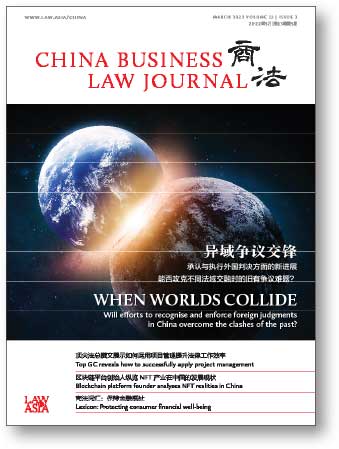Unfathomable as it may seem, transformational changes can often be just around the next corner. Therefore, it in the legal sector is vital to keep up with how people do business, make decisions and approach their work. In this issue, we explore some of the latest trends and unique work methodologies to prepare our readers for future challenges.
An existing tricky issue now has a fresh outlook. When resolving commercial disputes in China, the enforcement of arbitral awards has been viewed as the most accessible method for foreign parties to enforce their rights to a contract in Chinese courts, compared with the option of litigating the matter in their own local courts and then attempting to get this foreign judgment recognised and enforced in China.

By taking stock of how foreign judgments were enforced in the past, either under bilateral treaties or following the principle of reciprocity, our cover story of the issue, When worlds collide, features an analysis of the progress made, and compares litigation with arbitration under the current regime.
Wisdom surounding disciplines outside the law, often overlooked by many in the profession, also brings in novel perspectives for the in-house role. In Step up your legal game, Steven Cao, general counsel of China Gezhouba Group Overseas Investment, explains how in-house counsel can successfully apply project management methods to boost their legal department’s capacity.
Parallel with corporate activities, the work of legal departments can be seen as managing projects with tried-and-tested techniques from management science. These practices include adopting modular management for investment and acquisition projects, and employing a stakeholder analysis template for financing projects involving multiple parties.
New sectors such as blockchain applications, discussed by many but understood by few, are being widely experimented with by domestic companies, despite a blanket ban on cryptocurrency trading and crypto mining by Chinese regulators. Among all applications, NFT is the most visible, and, more importantly, one in which there is still room for domestic explorations. Tech giants such as Alibaba and Tencent even rebranded their NFT offerings as “digital collectibles” in order to steer away from potential scrutiny.
In Unchartered frontiers, Allen Sun, the founder of blockchain platform BlockVita, talks to China Business Law Journal about what really constitutes the NFT industry in the country, what legal constraints exist, and what we should understand about the hype.





















